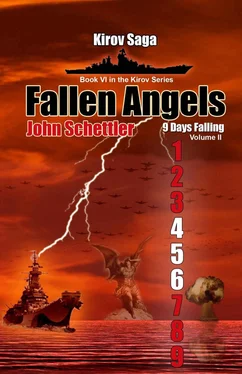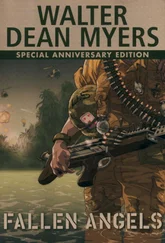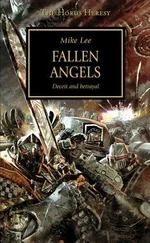“Take us up, and quickly. Get us back under cloud cover!” He realized they could not linger there, an enormous hovering helicopter beating the skies with its massive props.
Troyak gave him a questioning look. “What do we do, Colonel?”
“See that structure there? I’m willing to bet the signal is coming from that location. That’s looks to be a detention camp or prison. I could see guards and barbed wire on the walls. Orlov is there! But we can’t very well just land here with a single squad. We’ve already drawn the attention of those guards. Let’s get higher.”
“What then?”
Fedorov’s mind was working quickly. They brought only a single squad. There would be guards, perhaps a full battalion of NKVD here. This was a prison, and access would be very restricted. He would need more resources if they were to consider taking the place to rescue Orlov, and the longer they lingered here with the helicopter…
No, he could not risk the Mi-26. If anything happened to it then there would be no way to attempt the delivery of those remaining two control rods to Karpov. He knew what he had to do.
“Can you activate his jacket from here?”
“I believe so.”
“Then get it to broadcast its IFF location beacon signal. You say that will range out to 50 kilometers and we should be able to pick him up again easily. But at the moment, we need to get this big fat helicopter out of here. Head for the Anatoly Alexandrov . We’ll need more resources.”
“And then what, sir?”
“Then we take that prison, find Orlov, and go home.”
Troyak took one last glance at the prison and the surrounding area now before they were swallowed by the cloud deck again. “Very well,” he said confidently.
“You think we can take the place and hold it for a while?”
“Certainly, sir.”
“But Troyak…From the looks of that column we saw back there the Germans could be here soon. There doesn’t seem to be any organized defense here. Something has changed in the history. They weren’t suppose to get this far south.”
“Well, sir. We can do something about that if you wish. I can stop that column.”
“You can stop it?”
“We have a full company of Marines on the Anatoly Alexandrov , and then some.”
“So we have,” said Fedorov thinking. Intervention would be risky, even rash, but then it occurred to him that they might set right whatever had gone wrong and save Makhachkala and the precious oil beyond at Baku. If the Germans were to take it who knows what the consequences might be.
He was torn for a time, reluctant to do anything to cause yet more alterations in the history, but at the same time he was looking at an invading army overrunning his homeland down there. The memory of Orlov’s note came to him now…
“Fedorov, are you reading this? Are you listening? I know you must have spent many long nights in your search. Well here I am! Yes, Gennadi Orlov, the Chief, the one who bruised your cheek that day in the officer’s mess… I always did have a Bolshevik heart. It’s not that I am not afraid to die. I worked my ass off in the service because I love my people, my country, my Motherland. I want to tell my comrades in arms that I have never known cowardice or panic. I left you all to find a life here on my own, and one I never could have before. I do not know what may have happened to you and the ship and crew I once served. My dying wish is that you destroy our enemies once and for all. Be heroes, be valiant men of war so that history will remember you as defenders of the Rodina. Should you ever find this, and learn my fate, I hope that you, courageous Russian sailors, will avenge my death.”
“Sergeant Troyak,” he said slowly. “You will lead the assault.”
“My pleasure, sir!” Troyak’s smile lifted a good bit of weight from Fedorov’s soul. They were going to war.
AdmiralFraser sat in the wardroom aboard Duke of York , thinking. His eye fell on the long sword and gilded scabbard, which he always kept close with his sea chest and other personal effects. It was a very special gift, and one he always wore on special occasions and ceremonial events. He had intended to wear it for the surrender ceremony in Tokyo Bay aboard Missouri , but all that was on hold now. The war was not yet over. He could not yet put away the sword for good.
As he looked at it, the memories returned, the adventure of it all, and the hardship. Back then he was only Commander Fraser, but newly promoted and so very proud, a young man of thirty one-years. They had just backed down the Germans in the First World War, on land and by sea, and he had been part of the Royal Navy supervision of the internment of the German Fleet. It was a heady time, with England rising to meet any challenge in the world, and prevailing. So it was that he volunteered for the first cherry assignment to come along, a stint with the White Russian Caspian Fleet to see if he could help get their ships in fighting order.
Fraser led a small group of Royal Navy Sailors on a long trek from the Dardanelles, across the Black Sea to Batumi where they took to a train heading east for the Caspian. He was beginning to feel just a little bit like T. E. Lawrence, the daring British officer who had raised such a ruckus in the Middle East during the war. It was all to be a grand adventure, but it didn’t turn out that way. The train was ambushed and the engineer refused to go any farther, which forced Fraser to literally back-track and return to Batumi. The only ship they could find was bound for Izmir far to the west on the coast of Turkey, but he gave it a go.
From there they took another train through Turkey this time bound for Baghdad, but once they arrive there no further transport could be found beyond a few horses and camels. So Lawrence of Arabia it was, he thought, and pressed on overland by horse, camel and foot. He and his party crossed Persia with a small Gurkha escort and eventually arrived at their destination, a small run down hovel with a single pier on the Caspian Sea called Enzeli.
The ships they were to inspect and refit were thick with rust and of no real military use, so Fraser determined to get himself north to Baku where he hoped to find the bulk of the White Russian Caspian Fleet. What he found instead was a few miserable floating hulks, rusting away without any regular maintenance. Yet with typical British pluck and a can-do spirit, Commander Fraser set himself to the task of refitting the small fleet… Until the Bolsheviks arrived.
The Reds did not take kindly to outside interference in their revolution, particularly those aiding the Whites. Fraser’s whole contingent was captured, stripped and bound on the quays while their clothing was searched, and then re-dressed only to be thrown into prison. The facilities were hardly accommodating, lice infested, unfurnished cells with bare earth floors. By day a wan light filtered through the metal grid on the ceiling, their only source of light and fresh air. Water was restricted to a single running tap for thirty minutes each day. There was no latrine, nor bedding of any kind, and the harsh conditions and poor nutrition with little more than watery soup, rice, and black bread laced with straw to eat soon undermined the men’s health and morale.
Worse than that were the atrocious psychological abuse they were subjected to, marched out and forced to watch executions, disembowelments of condemned prisoners, particularly the women. On one occasion the Armenian warden in charged ordered the summary execution of nearly ninety locals, who were shot with rifles then slowly finished off with pistols while the British were forced to watch. Whole families were condemned and died in this manner, though sometimes young children were left alive to wander aimlessly about the prison halls crying for their lost parents for days on end before they disappeared.
Читать дальше











